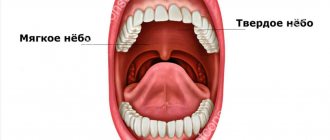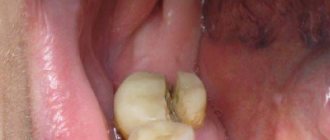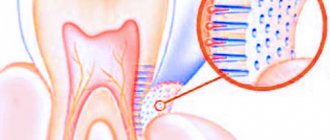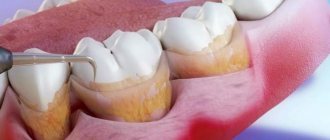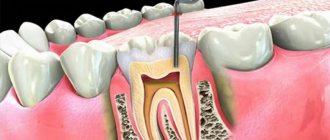A condition in which a certain area of the tongue or an entire organ loses sensitivity is called paresthesia. There are many reasons why the tip, middle or root of the tongue goes numb. These include both the impact of external factors and serious diseases that require immediate medical intervention.
Why does tongue paresthesia occur?
The main reasons that provoke numbness of the tongue include the negative influence of external factors and diseases, one of the symptoms of which is paresthesia. External factors include: excessive smoking, allergic reactions to foods and medications, injuries, injuries, burns, intoxication.
The tongue goes numb with the following diseases:
- A decrease in the sensitivity of the tongue may mean that a person has malignant tumors in the larynx or in the brain. This condition in neoplasms is not the main symptom; paresthesia accompanies severe headaches (in the case of brain cancer), nausea, low temperature and blood pressure. Oncological diseases of the larynx, in addition to numbness, are manifested by pain in the throat (as with ARVI), impaired sensitivity of the palate, unpleasant sensations and difficulties when swallowing.
- The tongue may become numb due to an incipient stroke or heart attack. With this condition, paresthesia of the hands, tongue and lips is one of the main symptoms. Additional symptoms include acute headache, dizziness, nausea and vomiting.
- Osteochondrosis of the cervical spine can cause impaired mobility, damage and numbness of the nerve endings of the tongue. Osteochondrosis may cause pain and dizziness.
- Violation of the psycho-emotional background. Severe stress and deep depression can provoke severe headaches, impaired sensitivity of the face, lips, and mucous membranes of the oral cavity. Psycho-emotional disorders are the cause of migraine with aura - a disease in which the head hurts severely and the functioning of the senses is disrupted.
- If the tip of the tongue becomes numb and hurts, a burning or tingling sensation occurs, it means that the person has developed glossalgia or glossitis.
Manifestation of different forms of glossitis of the tongue
- Diabetes mellitus, which occurs as a result of impaired insulin production, leads to a feeling of thirst, dry mouth, and partial loss of tongue sensitivity.
- Anemia can cause decreased sensitivity of the oral mucosa, numbness of the extremities, low temperature, pale skin, and poor coordination.
- Age-related changes. A woman during menopause experiences hormonal imbalances that can cause tongue numbness.
- Oral candidiasis is a disease that is accompanied by pain, plaque formation on the mucous membranes, itching, swelling and partial numbness of the tongue.
- Impaired functioning of the facial nerves (Bell's palsy). The pathology is expressed in partial paresthesia.
Paresthesia can be caused by transformations that occur in the body of a pregnant woman.
Determining the cause of tongue numbness by symptom localization
The tongue may lose sensitivity partially or completely. It is necessary to pay attention to which part of the organ is numb, since localization may indicate a specific disease.
Paresthesia begins with tingling of the tip of the tongue, then “running goosebumps” appear over the entire surface of the organ, and only after that there is a feeling of partial or complete numbness of the tongue.
In most cases, numbness in the tip of the tongue is a sign of the negative impact of external factors. This condition manifests itself with excessive smoking, alcohol consumption, intoxication, imbalance of vitamins and minerals in the body, especially with a lack of vitamin B12. Loss of sensitivity of the tip of the tongue can be caused by an allergic reaction, in which case the symptom will be accompanied by swelling and paresthesia of the oral mucosa.
Numbness of the tongue and hands, accompanied by an acute headache, requires immediate consultation with a neurologist. Paresthesia in tandem with migraine can signal a sharp drop in insulin and an increase in blood sugar. In this case, consultation with an endocrinologist is necessary.
Neoplasm in the larynx
Paresthesia of the throat and tongue indicates the occurrence of malignant neoplasms in the larynx. Numbness of the tongue and palate may be a manifestation of an allergic reaction. Injuries or damage to the glossopharyngeal nerve cause the root of the tongue to become numb.
A condition in which the tongue becomes numb and dizzy can be a symptom of VSD (vegetative-vascular dystonia), osteochondrosis, neurological disorders and disorders, pre-infarction or pre-stroke condition.
Tongue nerve damage
The lingual nerve provides sensation to:
- gums
- floor of mouth
- anterior two thirds of the tongue
People can sometimes suffer damage to the lingual nerve during a dental procedure. This damage can lead to numbness in the mouth.
Treatment
Most people with lingual nerve damage find that the condition goes away without treatment within about 3 months.
However, a 2021 study found that early treatment of lingual nerve injury with the steroid dexamethasone helped reduce nerve inflammation and help the lingual nerve heal.
Professional treatment for tongue numbness
Loss of tongue sensitivity is not an independent disease, but a symptom accompanying the underlying pathology. Only after identifying the reason why the tongue is numb will the specialist prescribe treatment, which will be aimed at eliminating the underlying disease or irritating factor.
In cases where paresthesia is caused by osteochondrosis, the following are indicated:
- physiotherapy;
- massage manipulations;
- physiotherapy;
- taking painkillers and drugs that enhance bone tissue regeneration.
Injuries that cause the feeling that the tip of the tongue is numb are treated with antiseptic rinses and dental gels. Allergic reactions that reduce the sensitivity of the organ are eliminated with antihistamines.
VSD (vegetative-vascular dystonia) is treated with drugs that increase blood circulation and dilate blood vessels in the brain. It is recommended to change the diet, introduce a nutritious diet, follow the rules of rest and work: 8-hour sleep, active lifestyle.
Oncological diseases require surgical intervention coupled with drug therapy ; at the initial stage of the disease, endoscopy can be done. In case of laryngeal cancer, the affected tissue is removed; in case of pharyngeal cancer, partial removal is performed, followed by restoration using plastic surgery.
Trigeminal neuralgia can be treated surgically, but destruction of the nerve is often required. Radiosurgery, a minimally invasive (bloodless) operation, is sometimes used.
Numbness caused by diabetes mellitus is eliminated after a course of treatment of the underlying disease. Injections or tablets are prescribed to normalize insulin levels, which eliminates dry mouth, thirst and loss of sensitivity.
The health benefits and harms of celery – petioles, leaves and roots
Register Login. Mail replies. Questions are leaders. How to properly defrost meat, approximately 1 kg? I put it in the refrigerator, but it didn’t defrost in 20 hours: 1 bet. Leaders in the category Lena-foam Artificial Intelligence. Vlad Oracle. Why does celery make my tongue go numb? Polina Uchenik, closed 5 years ago. Best answer. Agrepina Western Oracle 5 years ago You haven’t seen it yet!!!
Other answers. Ivan Ivanov Artificial Intelligence 5 years ago It is not smoked! Nadezhda Kuznetsova Artificial Intelligence 5 years ago Something like that I don’t have. We eat celery, both root and stem, in salads all winter. Sanych Master 5 years ago some kind person added cocaine as a seasoning. Svetlanka Artificial Intelligence 5 years ago And in what dishes and in what quantities do you eat it? Polina Uchenik 5 years ago Yes, I just chopped about a gram into the salad, without dressing, in half with cucumbers.
Svetlanka Artificial Intelligence Polin Artificial Intelligence 5 years ago you have some kind of disorder in fact there is no such thing. Elena Kabanova Student 2 years ago I also get numbness, I just eat the stems with salt. Similar questions. They also ask.
Switch to English registration. Phone or email.
Treatment of tongue numbness with folk remedies
Depending on the cause of numbness in the tip, root, or sides of the tongue, treatment may include alternative medicine methods. Rinses and compresses can significantly improve the condition and speed up the restoration of sensitivity.
Common traditional medicine recipes used for diseases of the oral cavity:
- A spoonful of soda and 4 drops of iodine are dissolved in a glass of warm water. Rinsing is done daily, morning and evening.
In addition to pronounced anti-inflammatory properties, plants have a calming effect. Two tablespoons of dry herb are brewed with a glass of boiling water, the decoction is infused for 15 minutes. The resulting infusion is used for daily rinsing of the mouth and for oral administration: take 1 tablespoon.
If the cause of numbness in the mouth is a disorder of the nervous system, the use of chamomile and sage in therapy is effective.- A tablespoon of St. John's wort and the same amount of celandine are poured into a glass of boiling water and infused for about 30 minutes. The resulting infusion should be used to rinse your mouth morning and evening.
- You can fight lost sensitivity of the tongue with the help of garlic. To do this, take a garlic clove and roll it in your mouth. The procedure should be done as often as possible. After using garlic, apply a compress with sea buckthorn oil to the tongue, which will prevent possible irritation of the mucous membrane.
- Dried femoral grass is poured with a glass of water, brought to a boil, and then boiled for about 5 minutes. The broth must be filtered and cooled. Rinsing is done twice a day, after which 1 tablespoon of infusion is taken orally.
Numbness of the tongue is a sign of a serious pathology, and not a separate disease. It is important to determine the root cause that caused the loss of organ sensitivity, and only a doctor can do this. Therefore, it is necessary to contact a therapist as soon as possible, who, after carrying out the necessary diagnostic measures, will redirect the patient to the right specialist. Timely identification of the cause of numbness and timely treatment will help prevent the development of the underlying disease and possible complications.
After the tooth extraction procedure
In approximately 7% of tooth extractions, patients experience paresthesia of the tongue2. This phenomenon is especially common after the removal of wisdom teeth, as well as older patients and people whose teeth are in too close contact with the lingual part of the jaw. If the doctor did everything correctly, then after the procedure itself and at the end of the freezing effect, the paresthesia should completely disappear within a few days, a maximum of a week. If the symptom persists for a long time, you should consult a doctor for professional advice.
Tooth extraction can cause numbness
Read more about complications that may arise after tooth extraction in our article>>>

